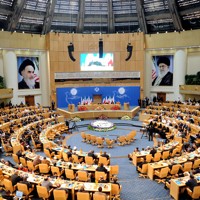The 16th summit of the Non-Aligned Movement (NAM) in Tehran late last month brought the group back into the international spotlight, years after the end of the Cold War called its very existence into question. With the fall of the Soviet Union, nonaligned nations suddenly found themselves unable to leverage superpower rivalry to achieve their domestic and foreign policy objectives. Moreover, in the post-Cold War unipolar world, Washington’s preponderant influence meant that nonaligned nations needed to drastically alter their foreign policy to accommodate American interests. The rapid liberalization of national economies in countries such as India, Indonesia and Brazil is a case in point.
But it would be severely myopic to completely dismiss the political importance of an international congregation of 120 states, a gathering second only to the U.N. in membership. This is underscored by the outcomes of the Tehran summit, which offered three important takeaways with huge ramifications for contemporary international relations.
The first conclusion that can be drawn from the summit is that efforts by the U.S. and Israel to diplomatically isolate Iran are clearly not working. The first such indication was offered by U.N. Secretary-General Ban Ki-moon’s decision to attend the NAM summit, despite intense pressure from the U.S. for him to boycott the gathering. Representatives of all 120 NAM members were also present in Iran, which used the diplomatic platform offered by the summit to showcase itself as a victim in its standoff with the West over Tehran’s nuclear program. Iran opened the Natanz uranium enrichment facility to all members of the NAM, a move intended to convey the peaceful nature of its nuclear program. And in a superbly orchestrated propaganda coup against Israeli and Western efforts to undermine the program, Iran arranged for the remains of the wrecked cars of its slain nuclear scientists to be publicly displayed to the visiting dignitaries. The intended message was clear: Iran is a victim, not a perpetrator, of international terror.

